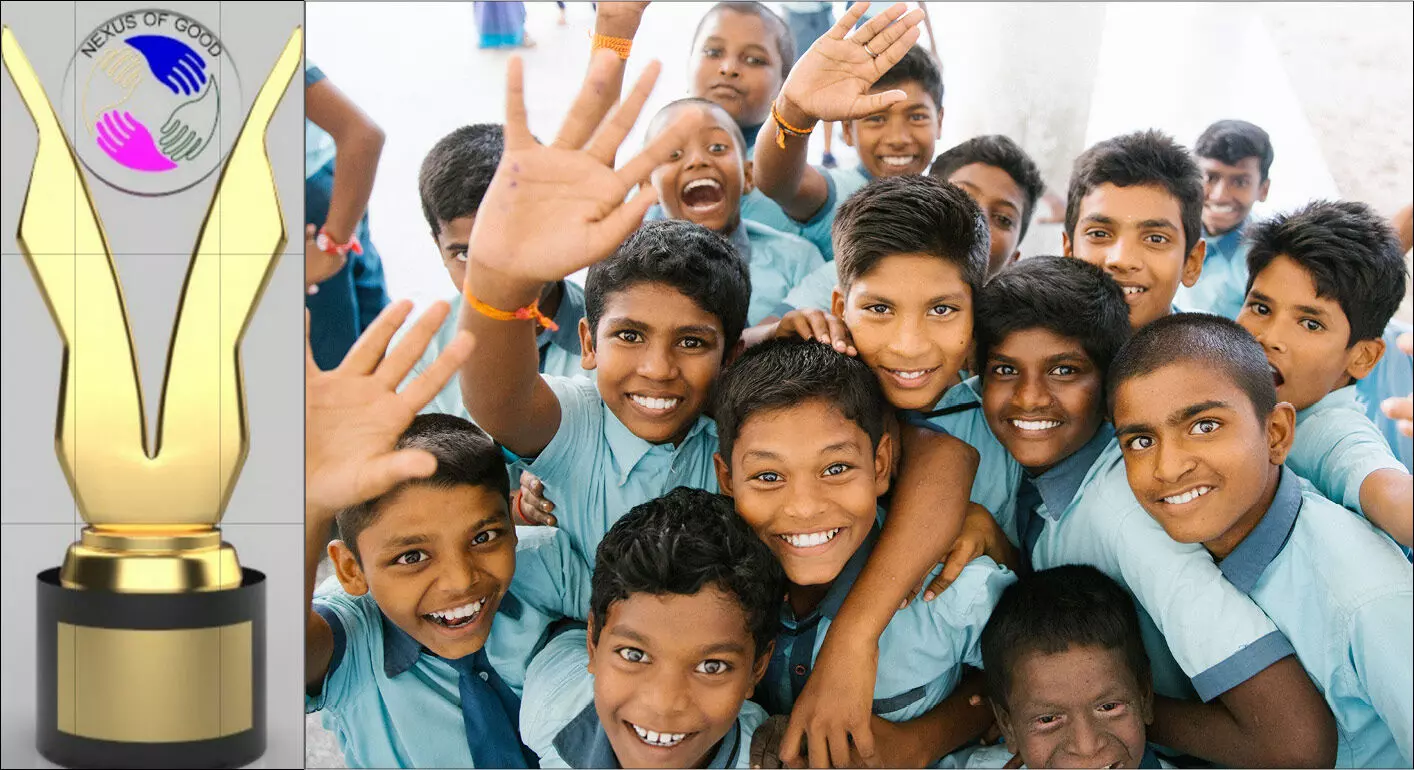Nexus of Good: An inclusive pursuit
Beginning from Chhattisgarh, Indus Action aims to bridge the gap between policy and action with a vision to realise the dream of inclusive education across India

Indus Action was deservedly selected as one of the awardees for Nexus of Good Annual Awards, 2023. Prabhat Kumar, former Governor of Jharkhand State and former Cabinet Secretary, Government of India, gave away the award at a glittering ceremony organised at FICCI, Delhi
In the heart of India lies a state with diverse demographics, rich culture, and an inherent socio-economic disparity: Chhattisgarh. As a nation, India's long-standing commitment to uplifting its vulnerable populace resonates strongly through its Right to Education (RTE) Act, 2009. This legislation was enacted primarily to ensure that every child in the country got quality education as a matter of right. While the legislative intentions were laudable, its implementation posed a number of problems as is true of most of the policies and legislations in the country. This legislation, in particular, had some additional issues around the issue of inclusion. This gap between policy and on-ground action is where Indus Action has anchored itself.
Objectives
Access to quality education: One of the paramount objectives was to ensure that economically and socially disadvantaged children in Chhattisgarh get access to quality education as per RTE’s 12(1)(c) provision. Under provision, private schools must reserve 25 per cent of entry-class seats for students belonging to economically weaker (EWS) sections and disadvantaged groups (DG) to promote inclusive education.
Technology-driven solutions: Recognising the power of technology in the modern age, Indus Action sought to leverage it to streamline the admission process, making it transparent, efficient, and user-friendly.
Awareness and community participation: Real change can only be initiated when the community is informed and involved. Therefore, Indus Action aimed to raise awareness about RTE provisions and promote active community participation.
Strengthening grievance redressal mechanisms: An effective grievance mechanism ensures accountability and trust in the system. Establishing and fortifying such a system was a pivotal objective.
Achieving the objectives
Access to inclusive and quality education: The need to partner with the state government was recognised upfront. By collaborating with the Chhattisgarh government, Indus Action played a significant role in establishing a centralised web portal for admissions under RTE 12(1)(c). This ensured a systematic, transparent, and efficient admission process, leading to increased enrolment rates. The initiative increased inclusive school spaces and improved vulnerable children’s access to quality education. 60 per cent of students enrolled are from EWS; 40 per cent are from socially disadvantaged groups.
Technology-driven solutions: Technology came handy in delivering the objectives. Creating the online portal for admissions and implementing an online reimbursement module in partnership with the Public Financial Management System (PFMS) represent the organisation's emphasis on tech-driven solutions. These platforms offer ease of use and ensure transparency in the process.
Awareness and community participation: Through strategic campaigns, Indus Action contacted schools, communities, and civil society organisations. They used existing data systemic channels and partnered with CSOs to ensure maximum outreach. Workshops, conferences, and on-ground campaigns made communities aware of their rights and the opportunities available under RTE. They became active participants in the entire process as willing partners.
Strengthening grievance redressal mechanisms: The introduction of a technology-enabled helpline has been instrumental in addressing grievances promptly. It offers real-time solutions to parents, schools, and government officials, ensuring that issues or concerns about the admission process are addressed swiftly.
Plans for the future
As Indus Action looks to the horizon, the vision remains clear: to make the dream of inclusive education a reality for every child in India.
Replicability and expansion: The success of the Chhattisgarh model has set a precedent. Indus Action replicates this model across other states, aiming for a pan-India impact. Collaboration with more state governments will be crucial to achieve this.
Enhancing technological infrastructure: With the ever-evolving landscape of technology, continuous updates and improvements to the existing tech platforms are on the cards. The aim is to make them more user-friendly, efficient, and inclusive.
Community empowerment: Indus Action recognises the power of an informed community. More grassroots-level campaigns, workshops, and interactive sessions are planned to empower communities further via the Samaaj 3.5 per cent programme, making them active stakeholders.
Policy advocacy: With the insights and experience gained from on-ground implementation, Indus Action plans to engage in policy advocacy. By working closely with policymakers, the organisation hopes to influence changes in the education policy framework, making it more effective and inclusive.
In conclusion, Indus Action's endeavour in Chhattisgarh is not just an initiative but a movement towards an inclusive, equitable, and just future for India. The organisation has successfully bridged the gap between policy and action through strategic interventions, unwavering commitment, and a clear vision. As we forge ahead, our journey represents hope, resilience, and a promise of a brighter future for India's next generation.
Indus Action epitomises the philosophy of Nexus of Good. In the initial stage it set up a model that is replicable and scalable. The key here is public-private partnership that makes scaling feasible. There is an appreciation of the fact that whereas innovation can come from the private domain, scale will happen only through public participation. The good news is that the model created by Indus action for ensuring inclusion in school education is already scaling and is set to scale further fulfilling the objectives of the Right to Education Act. It is also demonstrating that private and public domains need to come together to make things happen.
Views expressed are personal



